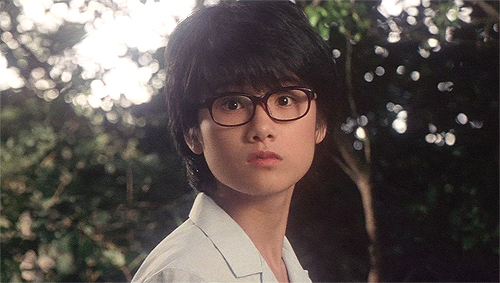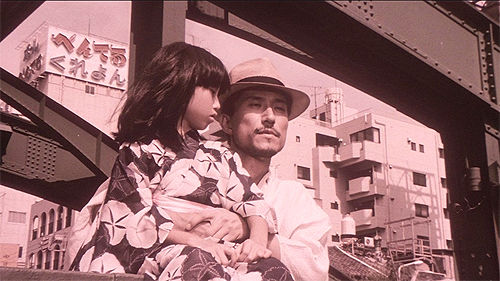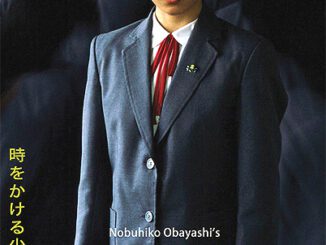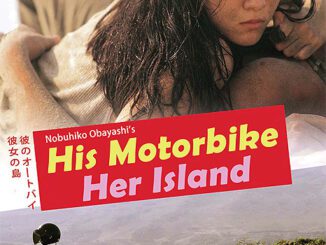The Island Closest to Heaven (1984)
Directed by: Nobuhiko Ôbayashi
Written by: Katsura Morimura, Wataru Kenmochi
Starring: Ryoichi Takayanagi, Tomoyo Harada, Toru Minegishi
Now Available from Third Window Films on Blu-ray and to Stream
Part of the Nobuhiko Obayashi’s 80s Kadokawa Years Collection
With its sweeping romantic music and seaside storybook atmosphere, Obayashi’s adaptation of a ‘warm-hearted tale’ might seem a far cry from some of his other projects, but it’s still a film about nostalgia in its own way. For the most part the whole thing is a coming-of-age drama without much of the director’s typical style and the few unreal moments included are very subtle. It’s kind of a road trip and it’s kind of a melodrama, with hints of fairytale and a whole lot of travelogue. But do any of these individual parts make up a broader and more compelling whole? It really depends on what you’re after in terms of world cinema appeal; and your tolerance for meandering lackadaisical storylines about naive teenagers.

During an introduction that feels a lot like an old photo coming to life Mari (Tomoyo Harada) thinks back to a time when she was a child. Her thoughts are with her father who has recently passed away, and a memory of when he described an island where people are ‘always happy’ because they’re ‘close to god’. This blending of reality and nostalgia is done with a skilled hand but is unfortunately never repeated as the rest of the story moves forward. In fact beyond the opening credits and a couple of scenes involving characters watching a sunset much of the film is pretty pedestrian. Which wouldn’t be so disappointing if it was told with more complexity. However, as Mari inevitably sets off to find the island she was told about there are a lot of lingering questions that only grow in number as things unfold.
It would make more sense if her mother, who has to be asked to spend her savings on the trip, came along on the journey. Or if in fact she was more of a real character and less of a cipher who seems undisturbed by the recent death or the holiday itself. Mari’s father on the other hand is explored just as little after the childhood prologue. It’s never clear why this one tall story from Mari’s long-term memory has had such an impact, or even why she remembers it so clearly. Why does she want to discover the titular island so badly? What kind of a man was her father in the years that have come and gone since then? We learn almost nothing about him; or any of the other central characters who show up during the journey.
Still, it’s a sweet and sickly holiday movie rather than a character study, and things do pick up elsewhere. Mari’s new friend Fukuko (Maiko Ogawa) injects some much needed energy into the narrative – drinking whisky and being generally abrasive on the flight out of Japan. As well as a summer story it’s also a Christmas movie since they’re travelling on a Santa themed tour package; the plane is even decorated with tinsel. However, soon Mari is sucked in by the island atmosphere and goes on a classic bicycle excursion to see the sights of New Caledonia. It’s here that she comes across farm delivery boy Taro (Ryoichi Takayanagi) during the first of many misadventures. Will these two youngsters fall in love and find out what heaven is really about?

A central romantic melodrama would make sense given the overall tone of the story. But like Fukuko, Taro isn’t really in the film enough so again we learn less about him, which presents a problem. Filling the void are a series of older men that Mari encounters during her travels. Which is about awkward as it sounds when Mr. Fukaya (Toru Minegishi) decides to hang out with the her and encourages her to leave her planned schedule to travel alone. At first it seems as though these characters, including a widower with two daughters and a prissy tour guide, will represent surrogate fathers during Mari’s odyssey. But when Fukaya talks about watching the sun going down with a past lover it’s clear that he’s got some strange ideas about how to behave around teenage girls. Naive sentimentality only goes so far with this subplot, which is fortunately brief.
Mari also finds herself in peril elsewhere during incidents like trips to see see local tribes, trying to get hotel rooms in shady parts of town, and injuries caused by local fauna. This would definitely seem like the proper moment to suggest she needs a parent or guardian, to remind her of dear old dad and get everything back on course. Instead she gets left behind by the Santa Tour and has to fend for herself until Taro finally resurfaces. It’s an odd situation as subplots about Second World War submarine tragedies and Fukaya’s old flame become the focus, instead of Mari’s experiences. In some ways these threads to provide perspectives on things like loss but the main result is that the film feels a lot longer than it really is, while simultaneously feeling rushed and disjointed.
In the end everything is resolved as people find connections or learn to let go of the past, or both, but thanks to the structure and the lack of characterisation it’s often unconvincing. Perhaps it’s because the film is shot in a documentary style that shows the unvarnished reality of the poorer island communities. It’s less a fairytale and more a journey to places that are only fun for the tourists, and only if they don’t stray off the path, which leaves little room for flights of fancy and colourful special effects. Of course the message could just be that materialism and lofty ideals never make people happy… but it’s a lesson that needs much more development. It’s an odd mixed bag of elements and some work better than others; it’s sometimes cute, it’s occasionally eccentric, but ultimately this isn’t the definitive tale of naive kids or summer romances.







Be the first to comment